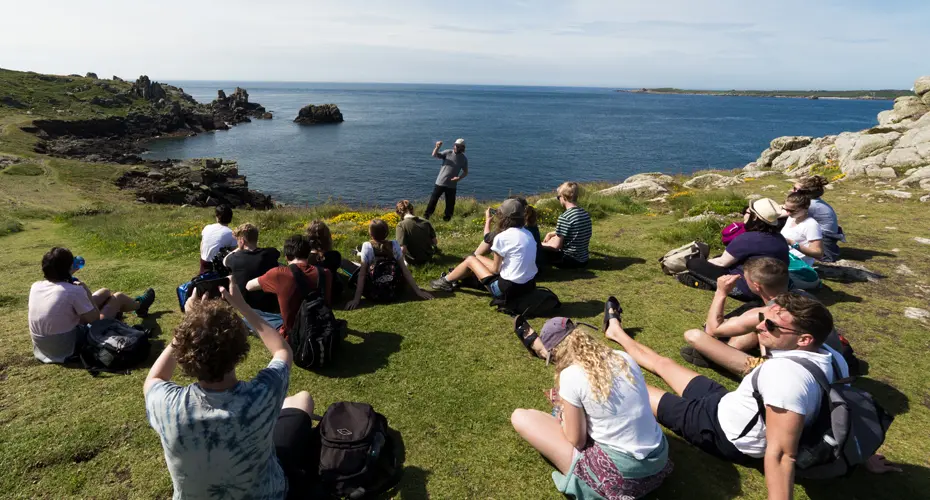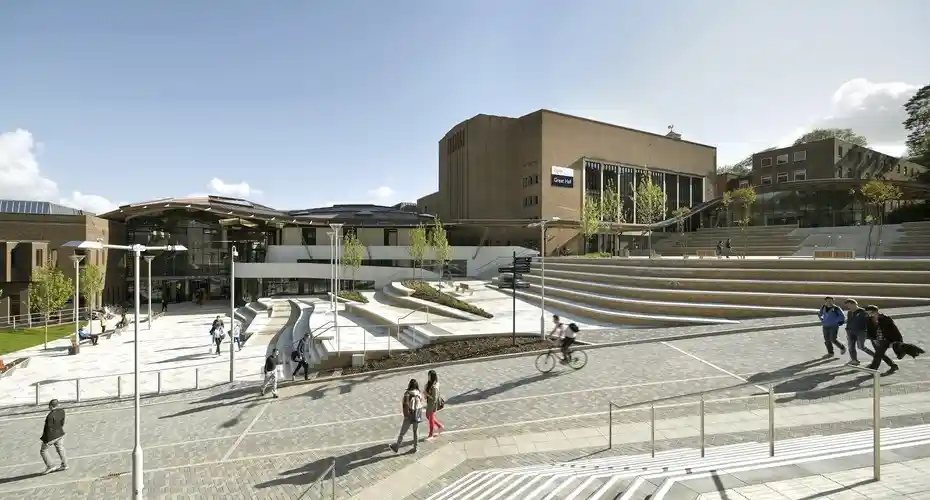| Degrees |
MPhil/PhD Geography (Human and Physical) |
|---|---|
| Duration |
| Start date | September, January or April |
|---|---|
| Locations | Penryn Campus
Streatham Campus |
| Study modes | Full time and part time |
Overview
Human Geography
In human geography our research is established around the following five groups:
- Cultural and Historical Geographies
- Space, Politics and Society
- Life Geographies
- Environment and Sustainability
- Energy Policy
Physical Geography
The Landscape and Ecosystem Dynamics group works on past, present and future environmental change.
Top 25 in the world for Geography
QS World University Subject Rankings 2022
6th in the UK for world-leading research in Geography and Environmental Studies
Based on 4* research in the Research Excellence Framework 2021
7th in the world for Geography
ShanghaiRankings Global Ranking of Academic Subjects 2021
High-quality research supervision, with access to excellent facilities
Top 25 in the world for Geography
QS World University Subject Rankings 2022
6th in the UK for world-leading research in Geography and Environmental Studies
Based on 4* research in the Research Excellence Framework 2021
7th in the world for Geography
ShanghaiRankings Global Ranking of Academic Subjects 2021
High-quality research supervision, with access to excellent facilities
Research overview
Interdisciplinary research institutes
Geography is part of two interdisciplinary institutes:
Global Systems Institute (GSI)
Geography plays a key role in the Global Systems Institute: a transdisciplinary group of researchers, educators and partners developing transformative solutions to secure a flourishing future for humanity as an integral part of a life-sustaining Earth system.
Environment and Sustainability Institute (ESI)
Geography also contributes to the Environment and Sustainability Institute on our Penryn Campus in Cornwall which has allowed us to expand our expertise in environmental and social change into areas focused explicitly on ecosystem services.
Human Geography research groups
Cultural and Historical Geographies
Focusing around six key themes:
- Geographies of creativity
- Creative geographies
- Historical geographies of science and exploration
- Geographies of landscape
- Visual, haptic and material geographies
- Theory and geophilosophy
Space, Politics and Society
This group is concerned with the question of ‘Who Gets What Where and How?’ We investigate contemporary geographies of inequality, injustice and insecurity, and seek to understand new scales of governance, the emergence of oppositional practices, and innovative forms of popular participation.
Life Geographies
Research focuses on the geographies and politics of living and material systems. We address key questions around geography, life science and bio-politics.
Environment and Sustainability
This is a group of leading and emerging social scientists who undertake interdisciplinary research on frontier issues of environment and sustainability. The group bring spatial and geographical dimensions to research on sustainability theory and policy, and undertake cutting-edge research in distinctive areas such as place attachment, political economies of energy, climate justice and ecosystem services.
Energy Policy
Based at our Penryn Campus, Energy Policy is a core element of our wider environment and sustainability research and has a focus on placing sustainability and change at the heart of debates about energy policy and governance.
Physical Geography research groups
Landscape and Ecosystem Dynamics
This group builds on Exeter’s established strengths in water, sediment and nutrient cycling, but integrates expertise in ecosystem functioning, carbon dynamics and climate modelling. A key focus is on the links between landscape processes and ecosystem responses to human activity and climate change.
Geographers at Exeter also contribute to the cross disciplinary Earth System Science group.
Research degrees
Successfully completing an MPhil or PhD entails undertaking an in-depth study of a particular topic and making an original contribution to knowledge in the field. Our MPhil/PhD students are actively involved in work at the cutting edge of research across the School’s research activities.
We welcome applications for MPhil/PhD study in human and physical geographies, and are particularly interested in projects that complement and extend existing strengths within and across our research groups.
Geography undertakes a clear upgrading process at the end of the first year of postgraduate research study. We will provide hands-on support throughout the duration of PhD study, working with you to ensure you achieve your potential and graduate within the stipulated timeframe.
The normal study mode is full-time, however students may be able to study part-time.
Assessment
The MPhil is assessed through a dissertation of up to 60,000 words. Assessment of a PhD is normally by a written thesis of up to 100,000 words and viva (oral) examination.
Split site study for international students
Visa regulations normally prevent international students from following the part-time option, although it may be possible to undertake your research at a distance via split site study. This involves spending the majority of your time in your home country, although you will normally be expected to attend the University for limited periods and you will need to prove you have access to appropriate academic facilities locally such as libraries, labs, computers and desk space.
Split site students are normally employed by, or registered with, a local institution, but receive support and supervision from staff at the University of Exeter. Some international students have also been resident in Exeter but returned to their home country to collect data.
The Universities of Exeter, Bristol, Bath, Plymouth and UWE Bristol have created the South West Doctoral Training Partnership (SWDTP) which draws together the established research excellence of academic and research staff at the five institutions. As part of the MPhil/PhD Sustainable Futures programme you will have supervisors from more than one discipline and more than one institution. Your home institution will be wherever your lead supervisor is based. Thus you will be able to benefit from the expertise of staff from a much wider base than is usual.
As a student of this programme you will undertake research that explores the interface between security, energy and the environment through engaging the latest critical thinking on risk management, critical infrastructure, public regulation, policy studies and the environmental sciences. Students on this programme could undertake research in the following areas: understanding the impacts of living with environmental change, the uncertainties of environmental change for energy and food security, and the diverse responses needed to foster behaviours, practices and policies that promote sustainability and resilience.
You will have access to numerous sessions, activities and resources through the SWDTP such as summer schools and advanced training events. In addition, you will have the opportunity to engage with events offered within the Faculty of Environment, Science and Economy, including reading groups and research seminar series. Further skills development is encouraged through our Researcher Development Programme.
Sustainable Futures falls under the umbrella of Human Geography (for fee information)
Our MSc has been developed to allow you to undertake a research project in an area that interests you and successful students have the option to transfer to an MPhil or PhD on completion.
We welcome applications for study in human and physical geographies, and are particularly interested in projects that complement and extend existing strengths within and across our research groups. View staff profiles for more details of the research interests of individual members of academic staff.
The programme gives you the flexibility to shape your own research in an area of particular interest to you. Like other research degrees you will be required to work independently, but with the support and guidance of an appropriate supervisor.
As a postgraduate research student you will also be able to take advantage of the University's Researcher Development Programme.
Support and supervision
We are committed to providing you with an effective and appropriate level of support. Our research studies culture promotes an inclusive and supportive environment and accessible supervisors.
Assessment
You will be assessed by a written thesis or scientific paper of up to 40,000 words in length.
> Visit our Masters by Research webpages for more detailed information.
How to apply
Normally students will have a good undergraduate Honours degree (UK Upper Second Class Honours or equivalent) and in some cases, a Masters degree.
As part of your application you will need to be able to prove that you have the research skills, vision and motivation to make your research project a success. Find out more about preparing a research proposal.
If you are seeking funding through one of the Research Councils (UK/EU students only), you will need to hold a minimum Upper Second Class Honours degree, although often these awards are won by those with First Class Honours due to high levels of competition.
Start date
You can start in September, January or April but we strongly encourage a you to enrol in Term 1 in September as induction events are focused around this start date. However, we do permit MSc by Research/MPhil/PhD students to enrol either at the start of Term 1, Term 2 or Term 3 (see the University's term dates), or on the 1st of any other month except August, September and October.
Requirements for international students
If you are an international student, please visit our international equivalency pages to enable you to see if your existing academic qualifications meet our entry requirements.
English language requirements
International students need to show they have the required level of English language to study this course. The required test scores for the following degrees fall under:
- Human Geography - Profile B2
- Physical Geography - Profile B2
Fees and funding
Tuition Fees per year 2025/26
Human Geography research
- Home: £5,006 full-time; £pro-rata part-time
- International: £23,500 full-time
Physical Geography research
- Home: £5,006 full-time; £pro-rata part-time
- International: £28,400 full-time
For those studying for more than one year, our fees are expected to increase modestly in line with Consumer Price Inflation measured in December each year. More information can be found on our Student Finance webpages.
Tuition Fees per year 2024/25
Human Geography research
- Home: £4,786 full-time; £pro-rata part-time
- International: £22,600 full-time
Physical Geography research
- Home: £4,786 full-time; £pro-rata part-time
- International: £27,500 full-time
For those studying for more than one year, our fees are expected to increase modestly in line with Consumer Price Inflation measured in December each year. More information can be found on our Student Finance webpages.
Our Postgraduate Funding webpage provides links to further information. If you are considering a PhD in the future, in addition to University of Exeter funding, we have been successful at securing postgraduate funding for PhD research through our Funded Centres.
Current available funding
Supervision
You can expect:
- High-quality research supervision to develop and nurture your potential
- A tailored supervision approach to help best suit your requirements
- Accessible supervisors who are enthusiastic about working directly with postgraduate research students
- Regular timetabled meetings with your supervisor
- 'Open door' policy to all postgraduate students - instant access to world-leading researchers who will share their expertise and ideas with you
- Regular meetings with your supervisory team, other members of your research group, and mentors
Training
Training for all geography research students
We are committed to ensuring that all Geography research students receive tailored research training to suit their individual needs. Postgraduate research students are permitted to attend Masters lectures and there is a suite of Masters modules that would enable you to acquire particular skills that may be a specific area for development.
In addition, you will be encouraged to participate in the University's Researcher Development Programme. This offers training in a wide range of generic and transferable skills in key areas such as research management, personal effectiveness, communication skills, networking, teamworking, and career management. There will also be opportunities to gain teaching experience, to broaden the scope of your knowledge, and to make presentations about your work in various forums. You will also be encouraged to publish your work as you progress through your research studies.
Training specific to human geographers
We are a recognised ESRC training outlet for Human Geography, which means that we can bid for studentships from the research council. As such, we offer a four-year PhD programme (1+3) where the first year of study provides you with the necessary skills and knowledge to undertake a three year PhD on successful completion. Should you progress to PhD, you will then be eligible to apply for open studentships.
Training specific to physical geographers
We are also a recognised research training outlet for Physical Geography. As such, training is given to all Physical Geography research students in line with that approved by NERC and covering a range of topics including methodology, data collection and data analysis. We have been very successful in securing NERC funded studentships which currently last three and a half years.
Support and supervision
We are committed to providing you with an effective and appropriate level of support. Our research studies culture promotes an inclusive and supportive environment and accessible supervisors.
Careers

No matter what your ambitions, aspirations or career choice may be there has never been a better, or more significant, time to study geography. Key global issues such as climate change, migration, environmental degradation and social cohesion are not only at the forefront of socio-political philosophies and attitudes, but are also deep-rooted within geography, making it one of the most relevant courses that you could choose to study.
You can be confident that a Geography research degree from the University of Exeter will serve you well upon graduation. Our students graduate with a wide range of skills desirable to employers including data gathering, problem solving, project planning, report production, presentation skills and team work. Almost all our research students have the opportunity to train to teach or teach, acquiring and practising additional transferable skills.
Opportunities on graduation are diverse and include work in academia, the voluntary sector, the public sector (eg, Environment Agency, councils), the private sector, and consultancy.
Projects
We offer a variety of research projects covering ocean, ice and terrestrial systems from physical geography but also research projects on urban futures form human geography.
The following projects provide a flavour of research areas in the Geography department, however if you are interested on a related area that does not appear on this specific projects, please do contact Ted Feldpausch, (T.R.Feldpausch@exeter.ac.uk) and we will be able to put you in contact with relevant academics that can help you tailor the research project you would like to pursue.
Projects by topic
- Ocean
- Ice
- Vegetation
- Soils & Peatlands
- Rivers & coasts
- Human Geography: urban futures
Find out more about the projects available.











